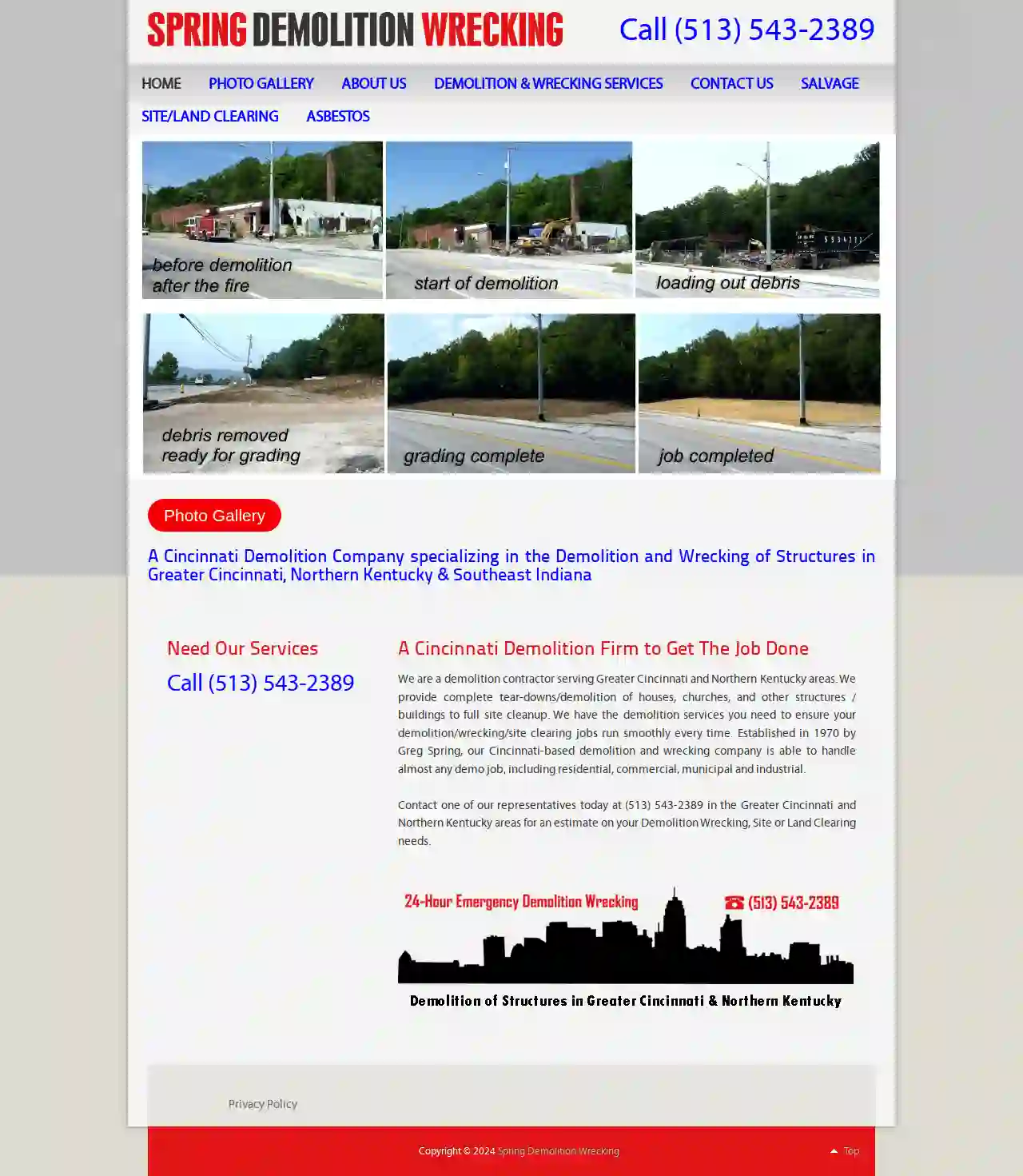Construction Companies Cincinnati
Find top Construction Company in Cincinnati
Receive up to 3 Construction Companies quotes for your project today! Compare profiles, reviews, accreditations, portfolio, etc... and choose the best service.
Ohio Dismantle is a full-service demolition company serving the greater Columbus, Ohio area. We specialize in safe and efficient demolition of residential, commercial, and industrial structures. Our team of experienced professionals is dedicated to providing our clients with the highest quality service at competitive prices. We are fully licensed and insured, and we take pride in our commitment to safety and environmental responsibility. At Ohio Dismantle, we understand that demolition can be a complex and challenging process. That's why we work closely with our clients to develop a customized demolition plan that meets their specific needs and budget. We also offer a variety of other services, such as site cleanup, debris removal, and asbestos abatement. Contact us today for a free estimate.
- Services
- Why Us?
A Cincinnati Demolition Company specializing in the Demolition and Wrecking of Structures in Greater Cincinnati, Northern Kentucky & Southeast Indiana A Cincinnati Demolition Firm to Get The Job Done We are a demolition contractor serving Greater Cincinnati and Northern Kentucky areas. We provide complete tear-downs/demolition of houses, churches, and other structures / buildings to full site cleanup. We have the demolition services you need to ensure your demolition/wrecking/site clearing jobs run smoothly every time. Established in 1970 by Greg Spring, our Cincinnati-based demolition and wrecking company is able to handle almost any demo job, including residential, commercial, municipal and industrial. Contact one of our representatives today at (513) 543-2389 in the Greater Cincinnati and Northern Kentucky areas for an estimate on your Demolition Wrecking, Site or Land Clearing needs.
- Services
- Why Us?
- Gallery
Cincinnati Demolition: Your Trusted Partner for Demolition and Site Services Cincinnati Demolition, a testament to perseverance, quality, and professionalism, was founded in 2009 by John Moore Jr. Starting as a one-man operation out of a modest Ohio office, we have since evolved into a respected industry leader known throughout Cincinnati, Ohio and the Tri-State Area. Our journey has been marked by a commitment to quality, safety, professionalism, integrity, diversity, and teamwork. We've grown and expanded our capabilities, handling a wide range of projects, from small residential tasks to large-scale commercial demolitions. Our comprehensive expertise, coupled with our commitment to safety and efficiency, makes us a reliable choice for any demolition project within the Tri-State Area. Our mission is to deliver the highest quality services while fostering long-term relationships with our clients. We understand the significance of maintaining exceptional quality, meeting strict deadlines, and offering cost-effective solutions. Our unwavering dedication to these principles has been the cornerstone of our success. We invite you to be a part of our journey as we continue to set new standards in demolition services. Trust Cincinnati Demolition to bring your vision to life, safely and efficiently.
- Services
- Why Us?
- Gallery
- Services
- Why Us?
- Services
- Why Us?
Over 8,502+ Demolition Contractors onboarded
Our demolition providers operate in Cincinnati and surroundings!
DemolitionMatch has curated and vetted Top Demolition Contractors in Cincinnati. Find a top & reliable pro today.
Frequently Asked Questions About Construction Companies
- Lump Sum Contract: The contractor agrees to complete the project for a fixed price, regardless of actual costs incurred. This type of contract offers more price certainty for the owner but shifts more risk to the contractor.
- Cost-Plus Contract: The owner reimburses the contractor for actual costs incurred plus a fee (fixed percentage or fixed amount). This contract provides more cost transparency for the owner but less price predictability.
- Time and Materials Contract: The owner pays the contractor for actual labor hours and materials used plus a markup. This type of contract is suitable for smaller projects or work with uncertain scope but can lead to cost overruns if not carefully managed.
- Unit Price Contract: The contractor provides a price per unit of work (e.g., square footage, cubic yard). This contract is commonly used for projects with repetitive tasks and well-defined quantities.
- Scope of Work: A detailed description of the construction work to be performed.
- Project Schedule: The timeline for completion, including key milestones and deadlines.
- Payment Terms: The agreed-upon payment schedule, including any deposits, progress payments, and final payment.
- Change Orders: A process for handling changes to the scope of work or project schedule.
- Warranties: Guarantees provided by the contractor on materials and workmanship.
- Dispute Resolution: Procedures for resolving disagreements between the parties.
- Design Changes: Alterations to the original plans or specifications.
- Unforeseen Conditions: Unexpected site conditions or hidden problems discovered during construction.
- Owner Requests: Additions or modifications to the scope of work requested by the owner.
- Functionality: Materials must meet the structural, performance, and durability requirements of the project.
- Aesthetics: Consider the desired appearance and design style of the project and choose materials that complement the overall vision.
- Budget: Construction materials come in a wide range of price points. Balance cost considerations with performance and aesthetic requirements.
- Sustainability: Opt for eco-friendly materials with low environmental impact, such as recycled content or sustainably harvested wood.
- Availability: Ensure that chosen materials are readily available and can be delivered within the project's timeframe.
- Maintenance: Consider the long-term maintenance requirements of different materials and choose options that are easy to maintain and repair.
What are the different types of construction contracts?
What is a construction contract?
What is a change order in construction?
How do I choose the right construction materials for my project?
What are the different types of construction contracts?
- Lump Sum Contract: The contractor agrees to complete the project for a fixed price, regardless of actual costs incurred. This type of contract offers more price certainty for the owner but shifts more risk to the contractor.
- Cost-Plus Contract: The owner reimburses the contractor for actual costs incurred plus a fee (fixed percentage or fixed amount). This contract provides more cost transparency for the owner but less price predictability.
- Time and Materials Contract: The owner pays the contractor for actual labor hours and materials used plus a markup. This type of contract is suitable for smaller projects or work with uncertain scope but can lead to cost overruns if not carefully managed.
- Unit Price Contract: The contractor provides a price per unit of work (e.g., square footage, cubic yard). This contract is commonly used for projects with repetitive tasks and well-defined quantities.
What is a construction contract?
- Scope of Work: A detailed description of the construction work to be performed.
- Project Schedule: The timeline for completion, including key milestones and deadlines.
- Payment Terms: The agreed-upon payment schedule, including any deposits, progress payments, and final payment.
- Change Orders: A process for handling changes to the scope of work or project schedule.
- Warranties: Guarantees provided by the contractor on materials and workmanship.
- Dispute Resolution: Procedures for resolving disagreements between the parties.
What is a change order in construction?
- Design Changes: Alterations to the original plans or specifications.
- Unforeseen Conditions: Unexpected site conditions or hidden problems discovered during construction.
- Owner Requests: Additions or modifications to the scope of work requested by the owner.
How do I choose the right construction materials for my project?
- Functionality: Materials must meet the structural, performance, and durability requirements of the project.
- Aesthetics: Consider the desired appearance and design style of the project and choose materials that complement the overall vision.
- Budget: Construction materials come in a wide range of price points. Balance cost considerations with performance and aesthetic requirements.
- Sustainability: Opt for eco-friendly materials with low environmental impact, such as recycled content or sustainably harvested wood.
- Availability: Ensure that chosen materials are readily available and can be delivered within the project's timeframe.
- Maintenance: Consider the long-term maintenance requirements of different materials and choose options that are easy to maintain and repair.


